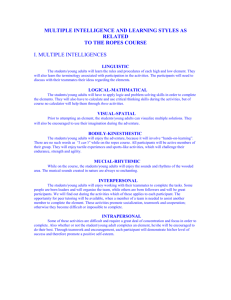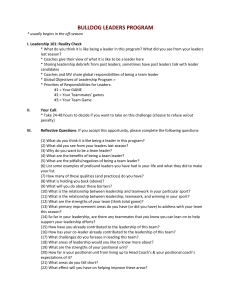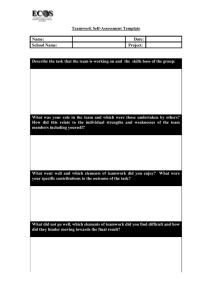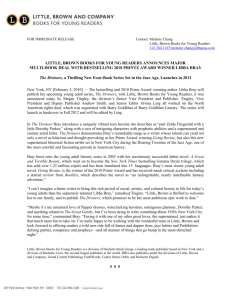Successful teamwork, regardless of the nature of the team, requires
advertisement
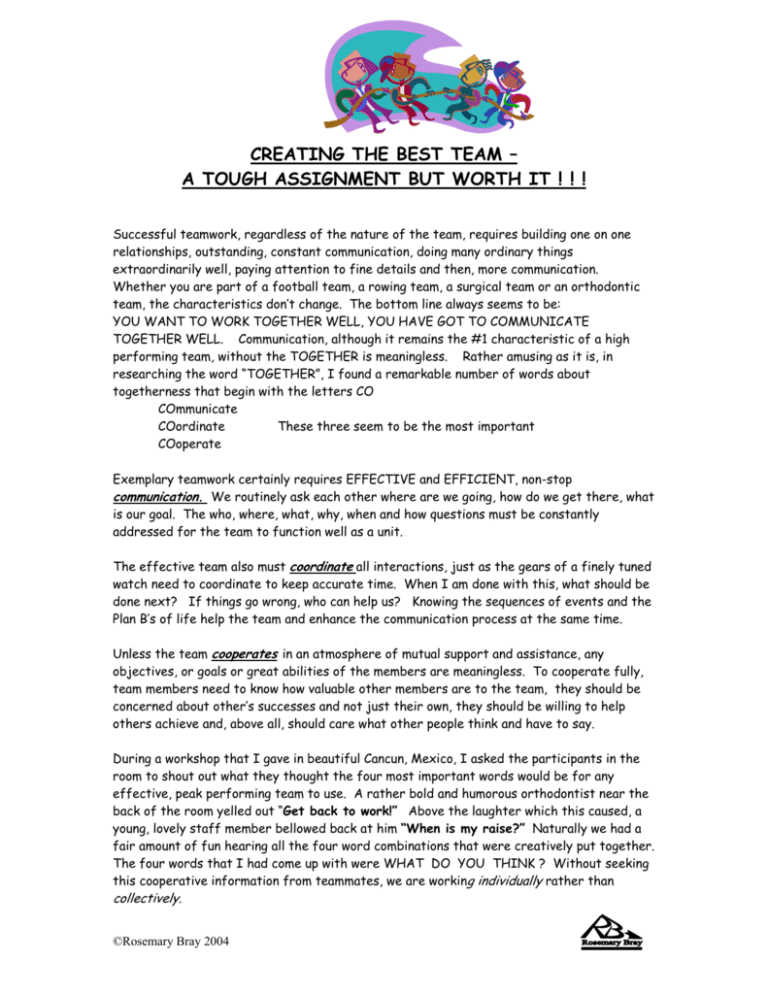
CREATING THE BEST TEAM – A TOUGH ASSIGNMENT BUT WORTH IT ! ! ! Successful teamwork, regardless of the nature of the team, requires building one on one relationships, outstanding, constant communication, doing many ordinary things extraordinarily well, paying attention to fine details and then, more communication. Whether you are part of a football team, a rowing team, a surgical team or an orthodontic team, the characteristics don’t change. The bottom line always seems to be: YOU WANT TO WORK TOGETHER WELL, YOU HAVE GOT TO COMMUNICATE TOGETHER WELL. Communication, although it remains the #1 characteristic of a high performing team, without the TOGETHER is meaningless. Rather amusing as it is, in researching the word “TOGETHER”, I found a remarkable number of words about togetherness that begin with the letters CO COmmunicate COordinate These three seem to be the most important COoperate Exemplary teamwork certainly requires EFFECTIVE and EFFICIENT, non-stop communication. We routinely ask each other where are we going, how do we get there, what is our goal. The who, where, what, why, when and how questions must be constantly addressed for the team to function well as a unit. The effective team also must coordinate all interactions, just as the gears of a finely tuned watch need to coordinate to keep accurate time. When I am done with this, what should be done next? If things go wrong, who can help us? Knowing the sequences of events and the Plan B’s of life help the team and enhance the communication process at the same time. Unless the team cooperates in an atmosphere of mutual support and assistance, any objectives, or goals or great abilities of the members are meaningless. To cooperate fully, team members need to know how valuable other members are to the team, they should be concerned about other’s successes and not just their own, they should be willing to help others achieve and, above all, should care what other people think and have to say. During a workshop that I gave in beautiful Cancun, Mexico, I asked the participants in the room to shout out what they thought the four most important words would be for any effective, peak performing team to use. A rather bold and humorous orthodontist near the back of the room yelled out “Get back to work!” Above the laughter which this caused, a young, lovely staff member bellowed back at him “When is my raise?” Naturally we had a fair amount of fun hearing all the four word combinations that were creatively put together. The four words that I had come up with were WHAT DO YOU THINK ? Without seeking this cooperative information from teammates, we are working individually rather than collectively. ©Rosemary Bray 2004 There are a few additional CO words that pertain to the true TEAM PLAYER atmosphere. TEAM players will: Consult and Confer with each other Constantly Contribute their own, original ideas Confide in each other Consolidate suggestions into Concurrent strategies Collectively Commit to the team Consent to solutions which are not their own Co-exist with positive relationships Co-author and Co-execute plans to bring about Congruent goals Convene together to Confirm that their practice is on track Coach Constructively Compliment others on their abilities Be Compatible and Congenial and Considerate Congratulate and Commend teammates Be Concerned and Conciliatory Show Compassion, Condolence and Comfort Above all, great teammates who work effectively and enjoy the process tend to be COHORTS, COMRADES, COMPATRIOTS and COMPANIONS Those of us who can remember the Three Musketeers can fully attribute those four CO descriptions to the Musketeer comrades and compatriots. The motto that the Three Musketeers had, could certainly be a part of every orthodontic team vision statement. It simply stated: “ALL FOR ONE…AND ONE FOR ALL !” So what is it that prevents most ortho teams from reciting this motto in unison at the conclusion of every morning huddle? Why is it that every office I visit and every staff member I speak to has the same question, “Why can’t everyone just get along?” In other words, “Why aren’t we all for one and one for all?” Last year, I conducted my own personal survey seeking ideas from approximately 100 quality orthodontic and dental practices across the country. The questions addressed the idea of teamwork –specifically, what makes it work and what tears it down? The responses weren’t particularly astounding – I heard exactly what I had expected to hear. In summary, the results were: WHAT TEARS DOWN A TEAM AND IMPAIRS PERFORMANCE? 1) Lack of, or ineffective, communication 2) Gossip 3) Excessive bickering 4) Jealousy 5) ‘Buck Passing” (That’s not my job) 6) Distrust, disrespect, inability to accept 7) Lack of recognition, reward and appreciation 8) Negative attitudes 9) Lack of purpose or goal ©Rosemary Bray 2004 10) Lack of commitment(to each other, to the office) WHAT CREATES EXCEPTIONAL, EFFECTIVE TEAMWORK ? 1) Great communication (not just good, but great) 2) High levels of mutual trust, respect and support 3) Team members are more concerned about others than about themselves 4) Strong leadership by the doctor 5) Team portrays a sense of “genuine-ness” and sincerity. They put people before profits. 6) Attitudes and behavior are positive and in line with the vision 7) Having FUN is a high priority and comes naturally 8) Personal values are in agreement with the office 9) Continual learning and growing is available 10) Visions and goals are clearly stated, understood and agreed upon In the survey, I also asked staff members to list the traits of other team members they had worked with over the years who demonstrated superior team building skills and made the group function more productively and in a positive atmosphere. They replied that in order to “play together well”, team members must: 1) practice great communication 2) have a positive attitude 3) have good, healthy self esteem 4) show respect for others, like to help others 5) appreciate and accept the differences in people 6) feel and show team spirit (be a Musketeer) 7) assume responsibility and be reliable 8) be loyal and committed to the practice 9) appreciate and accept kind criticism, coaching 10) trust their teammates PUTTING THE TEAM TOGETHER - - IT TAKES EIGHT ATES What do you do in order to get started? Step One towards a peak performing team is to INITIATE. Start with your thought, your dream your vision. What are you thinking about as far as a team? How many people make a team? What do you envision when you think of the word team? What do you, as doctor, as owner of the business, want to create? Step Two in the team creation is LOCATE. Where do we find the quality people to form this award winning team that we envision? In the newspaper? Perhaps. Through your sales reps and the dental society? Perhaps. From an employment agency? Could be. Remember that quality people usually surround themselves with quality people. Letting your staff, your colleagues, even your patients/parents know ©Rosemary Bray 2004 that you are looking for top notch employees is generally your best bet at finding just that. They all have friends and acquaintances and word of mouth can often prove to be an excellent recruiting method. If people in your dental community know that you are at the top of your field, they will likely want to be a part of what they see and hear Step Three in the process is to actually CREATE. This means, as Nike says, Just Do It ! Fulfill your vision and make your words, your actions consistent with that vision. In other words, do exactly what you said you would; “walk the talk”. If your vision said you were going to do “x”, then do “x”. If you said you are only going hire certain quality types of team players, then do not compromise yourself by bringing on Attitude Annie just because she is well skilled clinically. Step Four in Team Creation is to EDUCATE. This means go to seminars, bring in consultants to train and fine tune, listen to tapes, read the books, network with colleagues. Attend your local, regional and national meetings whenever possible. When your staff cannot be there, let them purchase the tapes made at the lectures. Provide in office cross training sessions for your team. Doctors all should sit down with the entire team and give an Ortho 101 class so everyone knows what you do, why you do it, how you do it and who specifically does what. Each team member must be responsible for writing her own job description and keeping it current. Is not the real purpose of education to replace an empty mind with an open one? And doctors, after you have spent time and energy and money in the education of your exceptional team, always remember that insightful quotation of Zig Ziglar’s: It is better to train your staff and have them leave, than to never train your staff and have them stay. Step Five is now to COOPERATE. Two rules simply can be applied to ensure that the team works together in a mutually cooperative Environment. The Golden Rule –to just treat your teammate the way you want your teammate to treat you. Secondly, The Platinum Rule – to treat your teammates they way they would like to be treated. BE the change you want to see in the world –Ghandi Step Six is the most difficult and also the most important. That is, to COMMUNICATE. We do this with constant discussion throughout the day, with the “morning huddle” meeting to set the tone for the day ahead, with one on one (doctor/staff) lunch meetings and with regular staff meetings that are to the point and productive. The top performing teams hold annual one to two day retreats, often away from the physical environment of the practice to allow their creative juices to flow, their thoughts and ideas to be well expressed and to provide social team time to better know each other. Retreats like these that I have been fortunate to participate in, give an often very necessary opportunity to reopen communication lines which have become closed for one reason or another. A very important aspect of communication is to listen – not merely to speak. Surveys tell us that the “average” doctor will interrupt his/her patient in the first eighteen seconds of conversation. Becoming a great listener is a most valuable trait of a ©Rosemary Bray 2004 quality team layer. Plato once said most accurately that wise men talk because they have something to say and fools talk because they have to say something! To MOTIVATE is the Seventh Step in Team Formation. By setting goals together, your team will be far more likely to work towards those goals than if the goals are determined by the doctor alone, or by an outside source. As a thirty year veteran employee, I know from my own experience that when I was directly involved in setting the goals of the practice, I was far more motivated to attempt the reaching, or even surpassing, of those goals. Allowing the team to monitor the results and then participate in some sort of an incentive, creates a feeling of ownership and accountability. In speaking with staff members all across the United States (and also in other countries), I am constantly reminded by them that they are ALL motivated by appreciation. The verbal, sincere thank you remains the number one incentive to do better and to achieve more. Trips to the shopping mall, days at the spa, money in the hand are always appreciated motivators. . .yet they still, and I hope will always be second to the pat on the back, the praise in public and the sincere kind word. Lastly, Step Eight of the “Eight Ates” is to CELEBRATE!! Wow! That’s the easy one. Take time out to acknowledge accomplishments big and small. Waiting for the end of the year to celebrate can be a de-motivator – so remember all along the way to be happy about and proud of the little steps that bring you to the larger goal. Getting three starts from three exams today is cause for celebration. The deband of an unusually difficult or involved case is cause for celebration. A team member’s fifth anniversary on the team is certainly cause for celebration. There are three kinds of team members on your team right now: 1) those who make things happen 2) those who watch things happen 3) those who wonder what happen When your team is comprised of the Number 1 type, let each other know how terrific that is and how valued they are. It is much easier to be the Number 2 or Number 3 type of team player and when we are fortunate to have Numbers 1’s instead, celebration is deserved! Easiest of all is to realize that any day in Ortho is better than any day doing anything else!! Have fun, lighten up and be glad you didn’t choose Hospice, Perio (sorry!) or the Cancer Hospital for your career!! It’s ORTHO! THAT IN ITSELF is the greatest celebration! (Not to be Reproduced Without Permission) ©Rosemary Bray 2004
